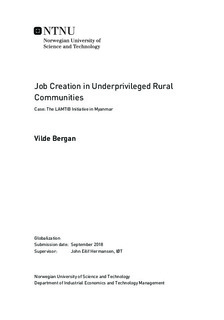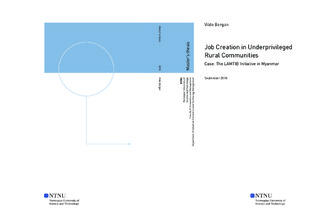| dc.contributor.advisor | Hermansen, John Eilif | |
| dc.contributor.author | Bergan, Vilde | |
| dc.date.accessioned | 2019-09-11T12:10:09Z | |
| dc.date.available | 2019-09-11T12:10:09Z | |
| dc.date.created | 2018-09-11 | |
| dc.date.issued | 2018 | |
| dc.identifier | ntnudaim:19499 | |
| dc.identifier.uri | http://hdl.handle.net/11250/2616248 | |
| dc.description.abstract | The aim of this study has been to reflect on a broader understanding of development challenges in Myanmar, with an emphasis on the agricultural sector. Sustainable poverty alleviation will be crucial to reach the sustainable development goals set forth by the UN. A vast majority of the global poor live in rural areas, and to end poverty these communities need to be targeted.
Key obstacles to rural development and business creation is identified as; access to credit, lack of infrastructure and technology, lack of network and weak rule of law. The study has found that the LAMTIB Initiative has a unique opportunity to boost job creation and hence, rural poverty alleviation. Their main strength lies in their leapfrogging technologies of energy and ICT tools.
Based on the results, recommendations have been proposed for further actions by the LAMTIB Initiative that could enhance job creation. These recommendations are specific for the structure and conditions of LAMTIB though some aspects and conclusions could be transferable to other development initiatives. | en |
| dc.language | eng | |
| dc.publisher | NTNU | |
| dc.subject | Globalization, Global Politics and Culture | en |
| dc.title | Job Creation in Underprivileged Rural Communities - Case: The LAMTIB Initiative in Myanmar | en |
| dc.type | Master thesis | en |
| dc.source.pagenumber | 93 | |
| dc.contributor.department | Norges teknisk-naturvitenskapelige universitet, Fakultet for økonomi,Institutt for industriell økonomi og teknologiledelse | nb_NO |

